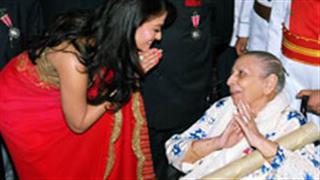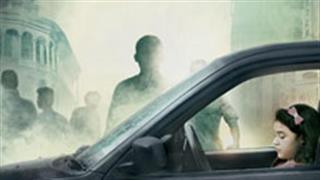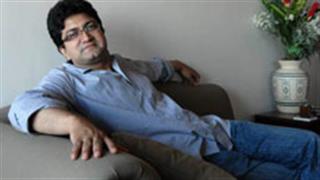Naushad-Mohammed Rafi
Rafi's ability to scale melodious heights in Naushad songs like 'O duniya ke rakhwale' or 'Insaaf ka mandir hai' and yet retain total control over his rendition made him the composer's blue-eyed boy in an association that straddled over four decades!
And to think, Rafi started in the chorus with the music maestro in the 1944 film, Pehle Aap! Naushad, already a successful composer by then, remembered the 20-year-old singer as `very shy, very decent.`
The hawk-eyed Naushad recognised Rafi's talent and began employing his voice regularly. After Rafi sang a refrain in the Saigal song Roohi roohi (Shahjehan, 1946), he made his first major impact with his solo rendition of Naushad's Anmol Ghadi (1946) composition 'Tera khilona toota'. But in that era, Naushad was an equal opportunity composer -- if he gave Rafi hit songs in Mela ('Yeh zindagi ke mele') and Dulari ('Suhaani raat dhal chuki') he also cast songs for Mukesh and Talat.
Wish we could write their names in gold but printing ink is all this page can hold. Lata Mangeshkar and Asha Bhosle unparalleled in music history

(In a now-ironical twist, in Andaaz, Naushad made Mukesh playback for Dilip Kumar while Rafi playbacked for Raj Kapoor!) Baiju Bawra (1952) was a turning point for Rafi.
Bharat Bhushan played Tansen's competitor and Rafi's vocals made it seem plausible. Rafi's impassioned yet technically deft singing so impressed Naushad that for the next two decades, he made Rafi his dominant male vocalist for the next two decades. In Naushad's myriad compositions, Rafi could effortlessly jump genres without missing a beat.
A vocal chameleon, he could sing a classical number ('Madhuban mein radhika naachegi') with as much felicity as a pop number ('Mujhe duniya walon sharaabi na samjho'). Whether it was a love paean ('Zindabad zindabad') or a robust number ('Nain lad jai hai toh, ' 'Maan mera ehsaan'), he met Naushad''s exacting demands.
Naushad made the singer Dilip Kumar's exclusive voice in the sixties; and successfully employed his voice for Rajendra Kumar too -- the title song of Mere Mehboob was rendered immortal by Rafi. Rafi's son Shahid Rafi recalls, `After my father expired, Naushad saab's family told me that he commented, 'Now I have to think what kind of song to compose and for whom. As long as Rafi was alive, I could compose any kind of song knowing he will be able to sing it well'.`
R D Burman-Kishore Kumar

For his first film as a composer, Chhote Nawab (1961), R D Burman chose Rafi as the male playback. But for his next film Bhoot Bangla (1965), he combined with a yodeling Kishore to produce the sonorous 'Jaago sonewalon' that galvanised listeners; and the duo went on to forge formidable anthems over the next 20 years.
Kishore Kumar (l) a class act
Kishore's singing career in the 1950s had found its groove thanks to the senior Burman. 'Kusoor aapka' (Bahar), Jeevan ke safar mein (Munimji), Chhod do aanchal (Paying Guest) were all composed by S D Burman. Pancham, as RD was known, was his father's assistant then; and Kishore, who was closer to his age, became a close affiliate.
From 1957-1964, Kishore steered clear of playback singing to concentrate on his flourishing acting career. When he restarted in 1965 it was with the Burmans -- both Senior (Guide, Teen Deviyan) and Junior (Bhoot Bangla).

The RD-Kishore Kumar found its major breakthrough with the 1968 comedy, Padosan, whose whacky ethos reflected the eccentricities of these two creative geniuses.
Kumar reaches the zenith of zaniness in 'Mere saamnewali khidki mein' as the paan-box-strumming, behind-the-curtains voice of Sunil Dutt. For an entire generation, the Kishore-RD combo was the very definition of youthfulness when they sang up a storm for 'Ek main aur ek tu' 'Yeh jawaani hai deewani' or 'Bachna aye haseenon'.
Naushad saab immortal as always
But what has also stayed with me over the decades is the softer Kishore-RD combo who captured the emotional undulations of 'O mere dil ke chayen' from Mere Jeevan Saathi and 'Tere bina zindagi se koi shikwa' from Aandhi. The two superstars of the 70s -- Rajesh Khanna and Amitabh Bachchan benefitted hugely from the confluence of these two musical virtuosos.

His songs with Rajesh Khanna are on my lips and fingertips, ''Yeh sham mastani' (Kati Patang), Chingari koi bhadke (Amar Prem), Deeye jalte hain (Namak Haram), Zindagi ke safar mein (Aap Ki Kasam). Even Khanna's forgettable films like Mehbooba are best remembered because of the Kishore-RD combine's divine 'Tere naina sawan bhadon'.
In the 1980s, RD continued to successfully use Kishore's voice for younger heroes like Kamal Haasan (Sanam Teri Kasam) and Sanjay Dutt (Rocky). Their song 'Saagar kinare dil yeh pukare' became viral just a couple of years before Kishore passed away in 1987.
Shankar Jaikishen-Mukesh

Mukesh was already a major singing success when he first collaborated with Shankar Jaikishen for Barsaat ('Patli kamar hai tirchi nazar hai, ' which vividly belies his reputation for sad songs). Earlier, the singer had scored hits like 'Dil jalta hai toh jalne de' and was perceived to be Dilip Kumar's voice after singing for him in Mela, Andaaz and Shabnam.
But Mukesh became permanently embedded in our collective consciousness as the ghost voice of Raj Kapoor after SJ made him sing 'Awaara hoon', the title song of Kapoor's Awaara (1951), that became a runaway success in both India and Russia.
However, Mukesh tried to reignite his acting career -- he played hero to Suraiya (Mashuqa, 1953) and Usha Kiron (Anurag, 1956) and it affected his singing career.
SJ chose Manna Dey to sing for Raj in some of the Shri 420 numbers and all of his Chori Chori songs but fortunately for Mukesh his Shri 420 chartbusters 'Mera joota hai Japani' and 'Ramaiyya vattavaiya' brought him back into the SJ fold.
The SJ-Mukesh collaboration thrived in Raj Kapoor films like Anari which won Mukesh his first Filmfare trophy as Best Playback Singer for his heartwarming rendition of 'Sab kuch seekha hamne'.
Tellingly, three of the four Filmfare awards won by Mukesh were for songs composed by Shankar Jaikishen. The 1960s witnessed the SJ-Mukesh team reaping a harvest of hits for Raj Kapoor like 'Hothon pe sachhai rehti ghai' (Jis Desh Mein Ganga Behti Hai) and 'Dost dost na raha' (Sangam).
SJ's spectacular compositions showcased Mukesh's gift for carefully calibrated expression. Listen to 'Dost dost na raha' in which Mukesh breathes a thousand different shades of intensity. The composers used Mukesh's vocals for other heroes too -- Dilip Kumar in Yahudi, Pradeep Kumar in Rajhath.
And they established Mukesh as Manoj Kumar's predominant playback after the actor's first hit Hariyali Aur Raasta. But it is the Mukesh-SJ team's creations for Raj that spell magic for me. Mukesh's grandsom Neil Mukesh speaks for multiple generations when he labels jeena yahan marna yahaan as, `haunting and unforgettable`. Shankar Jaikishen and Mukesh are no more but the songs continue to receive an encore.
Lata Mangeshkar-Madan Mohan

Composer Madan Mohan and singer Lata Mangeshkar played off each others strengths -- and strengths they had many. Lata could infuse just the right amount of emotion required for a gossamer Madan Mohan melody without raising her voice -- so evident in my pick as their creative apogee: 'Chand madham hai' (Railway Platform).
Lata called him `Madan Bhaiya` and the two had a mutual admiration society. Yet, when Madan began his career with Aankhen, he chose Meena Kapoor and Shamshad as his female singers.
But a year later, he struck a chord with Lata when she picked up the mike for Ada's melancholic 'Preetam meri duniya mein' and 'Saanwri soorat man bhaayi re piya' (she sounds so youthful and exuberant in the latter).
Though feted and made much of, this team had to wait an excruciatingly long time before their joint ventures met with commercial success. They had to wait for Bhai Bhai's success to make its song 'Kadar jaane na' not sound self-referential.

Madan Mohan became the uncrowned ghazal king in Hindi films after Lata sang Adalat's exquisite 'Yun hasraton ke daag' and 'Unko yeh shikayat hai.' Their other 24-carat burnished nuggets were ghazals like 'Aap ki nazron ne samjha'(Anpadh), 'Woh chup rahe toh' (Jahan Ara), 'Rang aur noor ki baraat' (Ghazal) and 'Hum hain mataa-e-koocha-o-bazaar' (Dastak).
Veteran actress Sadhana says, `Lataji has sung some of her best songs under the direction of Madan Mohan. I can't forget the songs of Woh Kaun Thi ('Naina barse rimjhim rimjhim') and Mera Saaya ('Nainon mein bhadra chhaye.')` Director Chetan Anand too was a connoisseur of the Madan Mohan-Lata duo (Haqeequat, Heer Ranjha, Hanste Zakhm).
The Madan Mohan-Lata magic continued unabated till he passed away at the young age of 50 in 1975 with their songs from Mausam ('Chhadee re chhadee') and Laila Majnu ('Koi patthar se na maare mere deewane ko') riding a popularity wave. When Yash Chopra culled some unused tunes of Madan Mohan posthumously and made Lata sing 'Tere liye hum hai jeeye' as one of the songs for Veer Zara, the line 'Zindagi leke aayi hai beete dino ke kitaab' came true.
Asha Bhosle-O P Nayyar

I wish the Asha Bhosle-O P Nayyar composition in which she challenges, ''Jaiye aap kahan jayenge' had become a prophecy and they had continued working together. Simply because the results of their combined effort were always stellar. Nayyar played a major part in building Asha's legend but the pair stopped working together after the Rekha-Sunil Dutt starrer Pran Jaaye Par Vachan N Jaaye (1974).
But what a swan song for an unforgettable composer-singer team! Amongst the films many glittering gems, 'Chain se humko kabhi apne jeene na deeya' shines the brightest. Ironically, the song was not shot at all! The Asha-OP Nayyar team had hit the high note with the feisty and folksy 'Uden jab jab jab zulfein teri' (Naya Daur 1957).
For the next 17 years after this perennially popular ditty, they created a web of romance on the airwaves. Their love songs from the road movie, Ek Musafir Ek Haseena, 'Aap yun hi agar humse milte rahen' and 'Bahut shukriya badi meherbani', are perennially popular.
Unlike some composers who made Lata playback for the heroine and let Asha croon for the second lead or the vamp, O P Nayyar gave Asha the best showcase. Asha crooned the breezy 'Jaaiye aap kahan jayenge' for Mere Sanam's heroine Asha Parekh as well as the seductive 'Yeh hai reshmi zulfon ka andhera' for the film''s vamp, Mumtaz.
O P-Asha made extraordinary music even in ordinary films and Sharmila Tagore was one of the biggest beneficiaries: Sawan Ki Ghata (''Holey holey chalo more sajana'), Kashmir Ki Kali ('Isharon isharon mein'), Yeh Raat Phir Na Aayegi ('Yehi woh jagah hai').
Such was their combined magic that 'Woh haske mile humse, hum pyar samajh baithe' from the Mala Sinha starrer Baharein Phir Bhi Aayengi made even romantic disappointment an exhilarating aural experience.
If you listen to the soulful 'Beqasi hadh se jab guzar jaaye' from Kalpana, you realise that Umrao Jaan may have earned Asha the epithet of Ghazal Queen but Nayyar spotted her versatility and tapped her flair for ghazals much before the others.




















